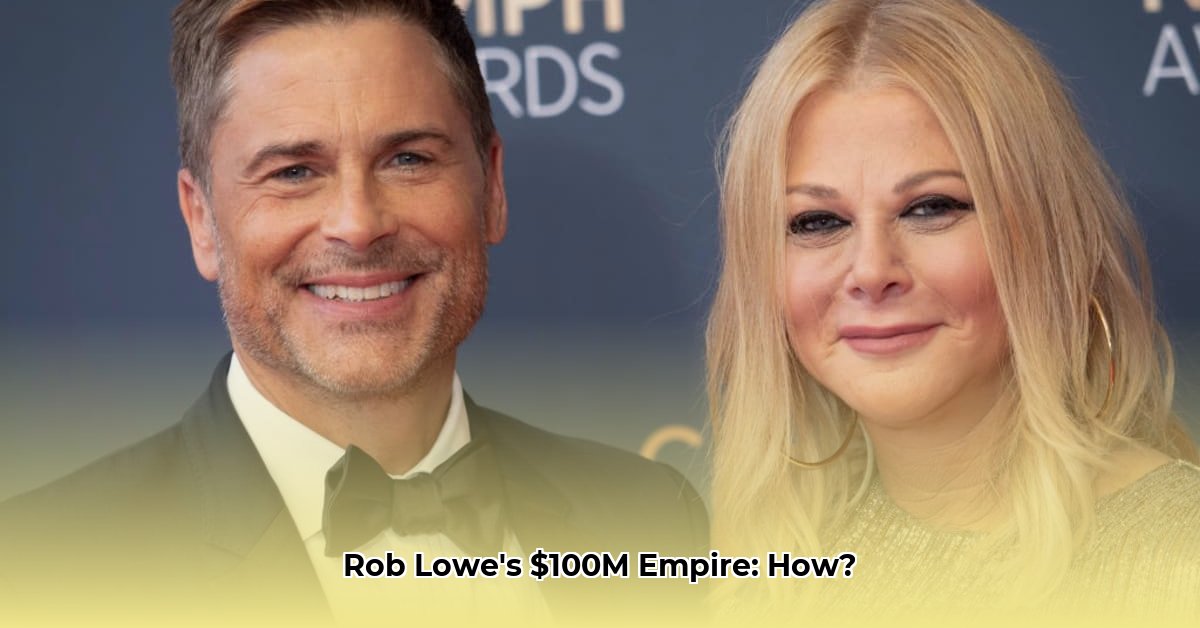
Rob Lowe's $100 million net worth isn't just the result of Hollywood charm; it's a testament to shrewd business acumen and strategic career navigation. This isn't a story of accidental success, but rather a meticulously crafted empire built on diversification, resilience, and a keen understanding of the entertainment industry's ever-shifting landscape. How did he do it? Let's delve into the strategies that transformed a teen heartthrob into a financial powerhouse.
From Teen Idol to Multi-Million Dollar Empire: A Strategic Career Trajectory
Lowe's journey began in the 1980s, catapulting him to fame with iconic roles in films like The Outsiders and St. Elmo's Fire. However, unlike many teen idols who faded into obscurity, Lowe demonstrated remarkable foresight. He didn't simply chase fame; he strategically built a lasting career. This involved making calculated decisions about the roles he accepted, ensuring a consistent stream of income and an ever-evolving on-screen persona.
Did Lowe's early success guarantee his future wealth? No. His transition to more mature roles in critically acclaimed shows like The West Wing and Parks and Recreation proved his adaptability and versatility, key factors in his sustained success. These weren't simply acting gigs; they were strategic investments in his long-term career trajectory.
Beyond the Silver Screen: Diversification as a Risk Mitigation Strategy
Lowe's financial success extends far beyond his acting roles. He understands the inherent volatility of the entertainment industry and has shrewdly diversified his income streams. Directing and producing provided creative control and additional revenue avenues. Hosting various shows and events further broadened his income sources and increased his public profile.
What's the single most important factor in Lowe's financial success? It's arguably his astute understanding of personal branding. Endorsement deals with major brands like DirecTV, KFC, and Atkins weren't random choices; they were carefully selected to align with his image and appeal to a broader audience. This strategic brand management transformed his name into a valuable commodity.
Navigating Adversity: Resilience and Reputation Management
The 1988 sex tape scandal presented a significant challenge to Lowe's career. However, he displayed remarkable resilience, handling the situation with professionalism and rebuilding his public image. This highlights the importance of crisis management in a high-profile industry, demonstrating his adaptability and strategic thinking in the face of adversity. This incident, though damaging, ultimately didn't derail his career; instead, it underscored his ability to learn from mistakes and adapt his strategy.
Risk Assessment: Navigating the Uncertainties of Hollywood
The entertainment industry is rife with unpredictable risks. Lowe's success stems from not only seizing opportunities but also proactively mitigating potential threats. Below is a summary of likely risks and mitigation strategies:
| Risk Factor | Likelihood | Impact | Mitigation Strategy |
|---|---|---|---|
| Negative Publicity/Scandal | Moderate | High | Proactive reputation management, careful brand choices |
| Market Shifts (Entertainment) | High | Moderate | Diversified income streams; adapting to new media platforms |
| Changing Audience Preferences | High | Moderate | Adaptability; continuous evolution of his acting style and roles |
| Competition for Endorsements | High | Low | Strong personal branding; focusing on a unique value proposition |
Building a Lasting Legacy: Lessons from Rob Lowe's Success
Rob Lowe's journey is a masterclass in long-term wealth creation. His success wasn't accidental; it was the result of a combination of factors:
Strategic Career Planning: He consistently chose roles that advanced his career, avoiding projects that might damage his reputation or limit his long-term potential.
Diversified Income Streams: His financial empire isn't solely based on acting; it encompasses directing, producing, hosting, endorsements, and potentially real estate investments.
Resilience and Reputation Management: He overcame adversity, showcasing his ability to learn and adapt in the face of difficult situations.
Smart Brand Management: He meticulously cultivated and protected his brand, becoming a trustworthy and appealing figure for endorsements and various ventures.
Rob Lowe's story provides valuable lessons for anyone aiming for success in any competitive field – the importance of strategic planning, the power of diversification, and the resilience needed to overcome inevitable challenges. His success is a testament to hard work, thoughtful decision-making, and a keen understanding of the business aspects of the entertainment industry.